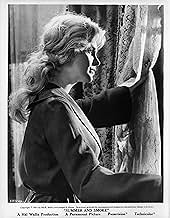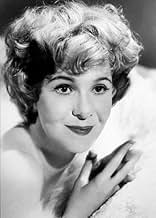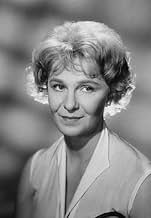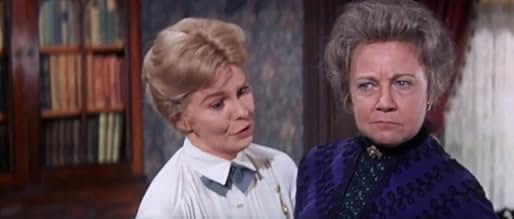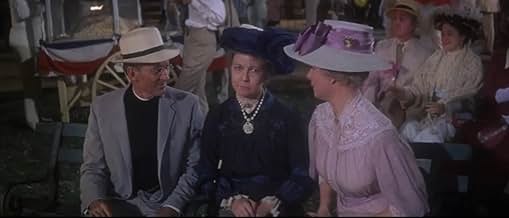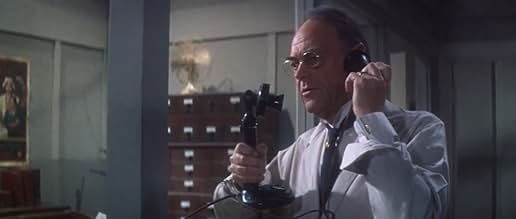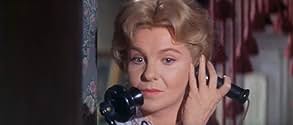AVALIAÇÃO DA IMDb
6,8/10
2,1 mil
SUA AVALIAÇÃO
Adicionar um enredo no seu idiomaA plain, repressed spinster falls for a dashing young medical student who prefers the wilder life, until it's too late.A plain, repressed spinster falls for a dashing young medical student who prefers the wilder life, until it's too late.A plain, repressed spinster falls for a dashing young medical student who prefers the wilder life, until it's too late.
- Direção
- Roteiristas
- Artistas
- Indicado a 4 Oscars
- 4 vitórias e 10 indicações no total
Max Showalter
- Roger Doremus
- (as Casey Adams)
Rico Alaniz
- Knife Thrower
- (não creditado)
Cheryl Anderson
- Alma as a Girl
- (não creditado)
Lon Ballantyne
- Orderly
- (não creditado)
John Barton
- Townsman
- (não creditado)
Ray Beltram
- Cantina Patron
- (não creditado)
Marjorie Bennett
- Saleslady
- (não creditado)
Dick Bernie
- Drummer
- (não creditado)
- Direção
- Roteiristas
- Elenco e equipe completos
- Produção, bilheteria e muito mais no IMDbPro
Avaliações em destaque
Geraldine Page had her first true starring role in "Summer and Smoke" released in 1961. Yes, she had been a theatrical star and did television work, and did fine in 1953's "Hondo" opposite John Wayne. But here, Page brings the repressed Tennessee Williams character of Alma to glorious life. The story, set in the 1920's, deals with the Southern small town stifling morals of the day. Page is a preacher's daughter, making her even more repressed; her father is played by actor Malcom Atterbury with all the proper moral condemnation. Her mother, played by old Hollywood star Una Merkel, is mentally unbalanced, adding to the responsibility Alma feels, as she lives at home with both of them. Alma is at an age that would have been considered a "spinster" of the times. Enter the young handsome doctor John (Laurence Harvey), whom Alma has known since childhood, since he lives next door with his cantankerous doctor father (John McIntyre). Alma desires John, but her own sexual inhibitions will now allow her to explore that, so she secretly lusts after him. John is a fellow who focuses on the physical, and takes up with a woman who would have been considered quite loose at the time (Rita Moreno in an early performance). John knows Alma desires him, and he is not sure how to handle it. He tries to take the relationship further, but Alma resists his sexual advances. Neither of these individuals is wrong for how they feel - and they seem to go through the whole movie not connecting. This is probably the finest work Laurence Harvey did on screen - his smoldering sexuality is used here to great effect. He and Page have palpable chemistry. The supporting players are capable as well, but this is Geraldine Page's show, and her genteel demeanor and southern accent are spot on. We are left pondering Alma - she is both tragic and wonderful.
When this was released I quickly made my way to the Fox West Coast Fine Arts Theater in Beverly Hills, California during its first-run engagement. Advance reviews were quite positive but I was unprepared for the power and yet the delicacy of Geraldine Page's performance as Alma Winemiller. Although I was never a fan of Laurence Harvey, who was cast in so many top films of that era, he joined his fellow players in affording Miss Page some very solid support. Una Merkel and John McIntire were especially worthy of praise, Earl Holliman acquits himself manfully in a brief role in the chilling final sequence, and Pamela Tiffin was touchingly beautiful as a heedless young thing. However, Rita Moreno, who has since complained about all those "spitfire" roles with which she was saddled during her earlier Hollywood days, probably counts this appearance as one of those she'd prefer we forget. (But, parenthetically, she has more than reason to be grateful for a list of credits that had already included the lovely Tuptim in the mega-box office hit, "The King and I," an Academy Award for her supporting role in "West Side Story," resulting in a career that continues to this day, outlasting many of the top stars who had led the casts of her earliest film assignments.)
Peter Glenville's direction (whose filmography is notably sparse) marshalls his actors and the top-notch production values with aplomb, aided by one of Elmer Bernstein's best scores. The VHS version does not appear to be letterboxed, thus losing cinematographer Charles Lang, Jr.'s elegant Panavision framing, which was one of this film's handsomer attributes.
Peter Glenville's direction (whose filmography is notably sparse) marshalls his actors and the top-notch production values with aplomb, aided by one of Elmer Bernstein's best scores. The VHS version does not appear to be letterboxed, thus losing cinematographer Charles Lang, Jr.'s elegant Panavision framing, which was one of this film's handsomer attributes.
I wanted to see this film after reading reviews of "Splendor in the Grass", which claimed that the basic idea for that movie was borrowed by William Inge from Tennessee Williams' "Summer and Smoke". I love "Splendor," and wanted to see if the 'Bard of the Midwest' could possibly have copied from his friend's homework.
I think nearly all the films made from Tennessee Williams' plays reveal their stage origins, but none more so than "Summer and Smoke". Sometimes that theatricality works in a film's favour as it does in "A Streetcar Named Desire", but here, it put me off at first. Nonetheless, there are many things I do like about the film.
Set in a small town in Mississippi in the early 1900's, the story centres around Alma Winemiller (Geraldine Page), the daughter of a minister. She is in love with the boy next door, John Buchanan (Laurence Harvey), the son of the local doctor. Repressed emotionally, she believes that personal dignity is the most important thing of all; he on the other hand is adventurous and wild. While she stays at home nursing her mentally ill mother, he goes out into the world experiencing life to the full.
John returns and has affairs with other women, including Rita Marino's Rosa Zacharias in a couple of over-the-top sequences. Alma is crushed, but although both eventually come around to the other's way of thinking, in the end they are just as apart as they were in the beginning.
Although Inge probably saw "Summer and Smoke" when it opened on Broadway in the late 40's, any influence was slight to say the least. As far as the two movies are concerned, "Splendor" is the more accessible work while "Smoke" struggles to overcome its stage roots.
"Summer and Smoke" does picks up the pace along the way, and the two leads are good together. Geraldine Page is an unusually arresting actress, and repeats her role from the stage. She has some tough speeches to deliver, but the vulnerability of her character is painful to watch.
I've always found Laurence Harvey a terrific screen presence, but a number of his peers from British cinema and theatre would disagree - some even thought him a bad actor. Maybe they got his roles on-screen mixed up with his life off-screen. However, there could also have been sour grapes involved; he was very good-looking, had a great voice and the camera loved him; he gives a confident performance in this film.
I knew Elmer Bernstein's score long before I saw the movie. It is a beautiful and nostalgic work with a heart-wrenching main theme. The music gives a haunting sense of loss to the film, offsetting the static sets and overlit photography. It shows the power of music to enhance a film.
"Summer and Smoke" presents some challenging ideas. It's not the best translation of Tennessee Williams to the screen, but more than one scene stays in the memory.
I think nearly all the films made from Tennessee Williams' plays reveal their stage origins, but none more so than "Summer and Smoke". Sometimes that theatricality works in a film's favour as it does in "A Streetcar Named Desire", but here, it put me off at first. Nonetheless, there are many things I do like about the film.
Set in a small town in Mississippi in the early 1900's, the story centres around Alma Winemiller (Geraldine Page), the daughter of a minister. She is in love with the boy next door, John Buchanan (Laurence Harvey), the son of the local doctor. Repressed emotionally, she believes that personal dignity is the most important thing of all; he on the other hand is adventurous and wild. While she stays at home nursing her mentally ill mother, he goes out into the world experiencing life to the full.
John returns and has affairs with other women, including Rita Marino's Rosa Zacharias in a couple of over-the-top sequences. Alma is crushed, but although both eventually come around to the other's way of thinking, in the end they are just as apart as they were in the beginning.
Although Inge probably saw "Summer and Smoke" when it opened on Broadway in the late 40's, any influence was slight to say the least. As far as the two movies are concerned, "Splendor" is the more accessible work while "Smoke" struggles to overcome its stage roots.
"Summer and Smoke" does picks up the pace along the way, and the two leads are good together. Geraldine Page is an unusually arresting actress, and repeats her role from the stage. She has some tough speeches to deliver, but the vulnerability of her character is painful to watch.
I've always found Laurence Harvey a terrific screen presence, but a number of his peers from British cinema and theatre would disagree - some even thought him a bad actor. Maybe they got his roles on-screen mixed up with his life off-screen. However, there could also have been sour grapes involved; he was very good-looking, had a great voice and the camera loved him; he gives a confident performance in this film.
I knew Elmer Bernstein's score long before I saw the movie. It is a beautiful and nostalgic work with a heart-wrenching main theme. The music gives a haunting sense of loss to the film, offsetting the static sets and overlit photography. It shows the power of music to enhance a film.
"Summer and Smoke" presents some challenging ideas. It's not the best translation of Tennessee Williams to the screen, but more than one scene stays in the memory.
"Summer and Smoke" is another Tennessee Williams southern drama that, after debuting as a play, was made into a film and later an opera. Set earlier in the 20th Century, it's the story of repressed passion, unrequited love and desperation. Geraldine Page stars as Alma Winemiller, the uptight daughter of a minister. She teaches voice, sings a little, and lives with her father and an insane mother (Una Merkel). Alma, since childhood, has been in love with the young doctor next door, John Buchanan (Laurence Harvey), the son of a doctor and a playboy. Buchanan has recently returned to town and is still a reckless playboy. Now he's involved with Rosa Zacharias (Rita Moreno), a girl from the wrong class and the wrong side of town. On the evening that something could have happened between Alma and John, she runs from him. One night, while a wild party is going on at the Buchanan house, Alma goes next door and learns that Rosa and John are going to be married. Upset, she calls John's father (John MacIntyre) at the hospital and urges him to return home. The result is tragedy.
This is a very powerful and poignant story of two people, one interested in earthly pleasures and one focused on the soul and spirit. Neither one is entirely right or wrong, but it creates a chasm between them. When each realizes what the other has been saying, it's too late for them.
Geraldine Page, who played this role to great acclaim on stage, brings her magnificent portrayal to the screen. The role was based on Williams' sister, who eventually went insane. If physically Page is a little less delicate looking than one imagines Tennessee Williams' female characters, her portrayal contains all of the fragility of the role. The final scene between Alma and a salesman, played by Earl Holliman shows the shocking contrast between Alma in the beginning and at the end of the film. Geraldine Page gave us all too few gems on films, as she concentrated on the stage. We have to savor what we have.
Laurence Harvey is very handsome and desirable, but probably a little too refined for the role of John. The role needs someone whose sexuality is less ethereal and more earthbound. Una Merkel is excellent as Alma's mother, a truly disturbed and frightening woman.
Very good film based on a Williams play, worth seeing for the wonderful Geraldine Page and its thought-provoking story.
This is a very powerful and poignant story of two people, one interested in earthly pleasures and one focused on the soul and spirit. Neither one is entirely right or wrong, but it creates a chasm between them. When each realizes what the other has been saying, it's too late for them.
Geraldine Page, who played this role to great acclaim on stage, brings her magnificent portrayal to the screen. The role was based on Williams' sister, who eventually went insane. If physically Page is a little less delicate looking than one imagines Tennessee Williams' female characters, her portrayal contains all of the fragility of the role. The final scene between Alma and a salesman, played by Earl Holliman shows the shocking contrast between Alma in the beginning and at the end of the film. Geraldine Page gave us all too few gems on films, as she concentrated on the stage. We have to savor what we have.
Laurence Harvey is very handsome and desirable, but probably a little too refined for the role of John. The role needs someone whose sexuality is less ethereal and more earthbound. Una Merkel is excellent as Alma's mother, a truly disturbed and frightening woman.
Very good film based on a Williams play, worth seeing for the wonderful Geraldine Page and its thought-provoking story.
I saw this movie at a theater in Springfield, Ohio, at the time of its original theatrical release. I don't know if memory makes things seem better than they really were but I rate this as the most memorable movies I have ever seen. I thought it was fantastic. I've not seen the video and I'm not sure that I would want to since this VHS edition is not letter-boxed. It would have a 1.33 aspect ratio instead of the wide, 2.35 aspect ratio of the original Panavision film. I think that would destroy much of the film's visual appeal. If this movie ever comes out on DVD, in the original Panavision aspect ratio, I'll be certain to buy it!
Você sabia?
- CuriosidadesHal Wallis Productions bought the film rights to the play in 1952, shortly before its Off-Broadway revival, for $100,000.
- Erros de gravaçãoWhen Nellie Ewell first comes to Alma's house, Nellie's ponytail changes from waist length to mid back length in between shots.
- Citações
John: Eternity? What does it mean?
Alma as a Girl: It's something that goes on and on - when life and death and everything else, is all through with.
John: Aw, there's no such thing.
Alma as a Girl: Oh, but there is. It's what people's souls live in. When they leave their bodies.
- ConexõesFeatured in Cinema: Alguns Cortes - Censura III (2015)
Principais escolhas
Faça login para avaliar e ver a lista de recomendações personalizadas
- How long is Summer and Smoke?Fornecido pela Alexa
Detalhes
- Data de lançamento
- País de origem
- Idiomas
- Também conhecido como
- Verão de Paixão
- Locações de filme
- Empresa de produção
- Consulte mais créditos da empresa na IMDbPro
- Tempo de duração1 hora 58 minutos
- Proporção
- 2.35 : 1
Contribua para esta página
Sugerir uma alteração ou adicionar conteúdo ausente

Principal brecha
By what name was O Anjo de Pedra (1961) officially released in India in English?
Responda

